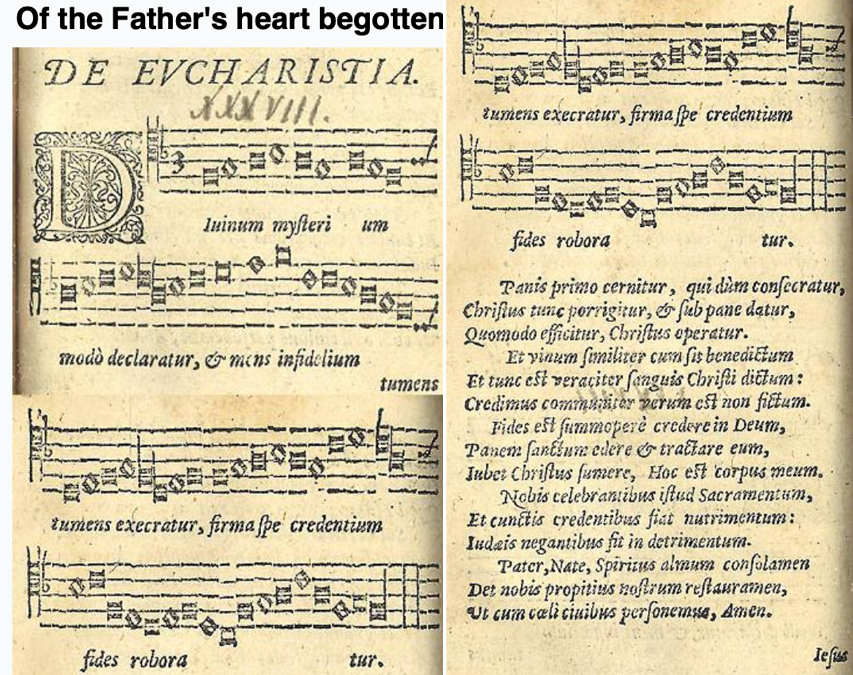Mozarabic Hymns 2: Terce, Sext, None in Lent: Prudentius
Feria
secunda: Ad tertiam in Quadragesima
In
the Durham Hymnal this hymn is used at Compline. The collectar specifies it for
the 3rd and 4th Saturdays and the 3rd Sunday
of Lent. It is taken from Prudentius, Cathemerinon VII and the Anglo-Saxon version does not have
the third stanza, nor the same doxology.
O
Nazarene, lux Bethlehem, Verbum Patris.
Quem
partus alvi Virginalis protulit,
Adesto
castis, Christe, parsimoniis,
Festumque
nostrum rex serenus adspice,
Jejuniorum
dum litamus victimam.
Nil hoc profecto purius mysterio,
Quo
fibra cordis expiatur vividi,
Intemperata
quo domantur viscera,
Arvina
putrem ne resudans crapulam
Obstrangulatae
mentis ingenium premat.
Hinc subjugatur luxus, et turpis gula,
Vini
atque somni degener socordia,
Libido
sordens, inverecundus lepos,
Variaeque
pestes languidorum sensuum
Parcam
subactae disciplinam sentiunt.
Nam si licenter diffluens potu et cibo,
Jejuna
rite membra non coerceant:
Sequitur,
frequenti marcida oblectamine,
Scintilla
mentis ut tepescat nobilis,
Animusque
pigris stertat ut praecordiis.
Amen. Honor, potestas, etc.
O man of Nazareth. Light of Bethlehem, the Word of
the Father, whom the birth of a virginal womb brought forth, assist us, O
Christ, in this season of chaste abstinence and a peaceful king watch over our
observance, while we offer up the sacrifice of fasting. Nothing is more
cleansing than carrying out this mystery, by which the very fiber of the living
heart is cleansed, through which the intemperance within us is conquered, lest
unbridled fat and sordid drunkenness be not restrained and oppress the natural
capacity of a strangled mind. In this way luxury and base gluttony are
brought low, degenerate sloth of wine and sleep, filthy lust and foolish wit
and the various plagues of sick feelings are subjected and made to feel
discipline of restraint. For if drink and food flow freely, the body is not coerced with proper fasting, it
follows that, exhausted by continual amusement, the noble spark of the mind
grows tepid and the soul sleeps from the laziness of the inmost heart.
Feria secunda: Ad sextam in Quadragesima
Referre
prisci stemma nunc jejunii
Libet,
fideli proditum volumine,
Ut
diruendae Civitatis incolis
Fulmen
benigni mansuefactum Patris
Pie
repressis ignibus pepercerit.
Gens insolenti praepotens jactantia
Pollebat
olim, quam fluentem nequiter
Corrupta
vulgo solverat lascivia:
Et
inde bruto contumax fastidio,
Cultum
superni negligebat Numinis.
Offensa tandem jugis indulgentiae
Censura,
justis excitatur motibus,
Dextram
perarmat rhomphaeali incendio;
Nimbos
crepantes et fragosos turbines
Vibrans,
tonantum nube flammarum quatit.
Sed poenitendi dum datur diecula,
Si
forte vellent improbam libidinem,
Veteresque
nugas, condomare ac frangere,
Suspendit
ictum terror exorabilis,
Paulumque
dicta substitit sententia.
Honor, potestas, etc
I would now tell the ancient origin of the fast,
passed down in that trustworthy book, how the good of the Father softening his
thunderbolt, repressing his fire by love, did not attack the inhabitants of a
city that deserved to be destroyed. Once a powerful people flourished with
insolent pride, in which, opulent and dissolute, their corrupted lasciviousness
had caused general dissipation, and so, obstinate in foolish disdain, they
disregarded the worship of the heavenly God. After a long indulgence, the
divine justice so offended is indignant and armed his hand with a sword of
fire. Dark clouds burst out with a crash; Livid and thunderous fires shake the
vault of heaven on the head of the guilty. But, they are given a time to
repent; He is still free to censure the
course of their shameful debaucheries; They may, if they will, arrest the
disorders in which they have grown old; The merciful vengeance deigns to
suspend its blows; and for a brief space the sentence already issued was
suspended.
Feria secunda: Ad nonam in Quadragesima
Sed
cur vetustae gentis exemplum loquor?
Pridem
caducis cum gravatus artubus
Jesus,
dicato corde jejunaverit;
Praenuncupatus
ore qui prophetico.
Emmanuel
est, sive nobiscum Deus?
Qui
corpus istud molle naturaliter,
Captumque
laxo sub voluptatum jugo,
Virtutis
arcta lege fecit liberum,
Emancipator
servientis plasmatis,
Regnantis
ante victor et cupidinis.
Inhospitali
namque secretus loco,
Quinis
diebus octies labentibus,
Nullam
ciborum vendicavit gratiam,
Firmans
salubri, scilicet, jejunio
Vas
appetendis imbecillum gaudiis.
Honor, potestas. Etc.
But what does the example of an ancient people
tells us? When Jesus himself, long since
weighted down with a perishable body, fasted with a dedicated heart; he
who was long before named by the mouth of
prophecy ‘Emmanuel’, or, ‘God with us’. He, who had a weak body
according to nature and yet loosened
from the captivity of the yoke of pleasure, made free by the strong law of virtue,
deliverer of created slaves, victor over the concupiscence which previously
ruled them.For hidden in an inhospitable place, in the course of five times
eight days, he did not demand the grace of any food, strengthening with a
healthy fast the weak vessel for the joys sought.












